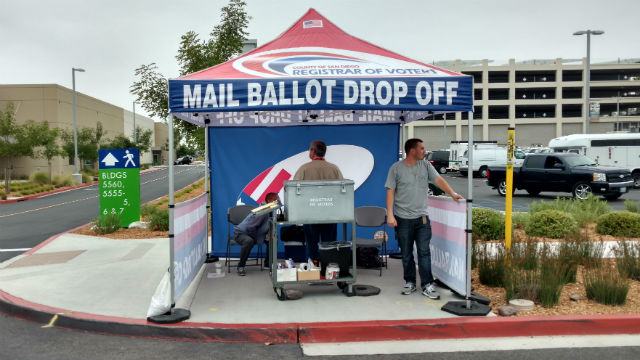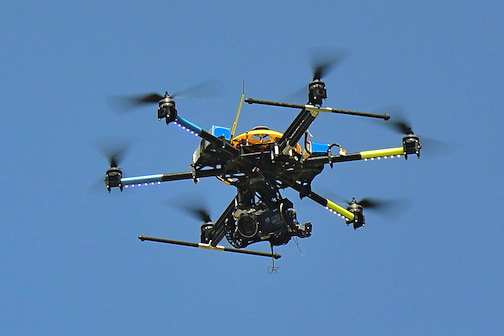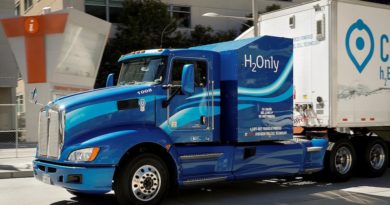Daily Business Report-June 6, 2016
The mail ballot drop off booth at the San Diego County Registrar of Voters. (Photo by Chris Jennewein/Times of San Diego)
What You Need to Know
About Tuesday’s Election
Times of San Diego
San Diegans are expected to go to the polls in record numbers on Tuesday to nominate presidential candidates and decide key local races and propositions.
Here’s what you need to know about when, where and how to vote:
Polls are open from 7 a.m. to 8 p.m. on Tuesday. If you don’t know your polling place, you can check online.
If you can’t vote in person on Tuesday, and didn’t request a mail ballot, you can vote in person at the San Diego County Registrar of Voters on Sunday and Monday. The office at 5600 Overland Avenue in Kearny Mesa will be open from 8 a.m. to 5 p.m. both days.
Mail ballots must be received by Tuesday. If you forgot to mail yours, you can drop it off at a booth in the registrar’s parking lot, or at many public libraries around the county.
Voters registered with no party preference can request a ballot with Democratic Party, American Independent Party, or Libertarian Party presidential candidates when they arrive at a polling place.
Only registered Republicans can vote in that party’s presidential primary.
State law allows workers up to two hours off, without a loss of pay, to vote if they do not have enough time to do so in their non-work hours and have informed their employer in advance.
There are hundreds of candidates and numerous propositions. Check out Times of San Diego’s Voter Guide and Proposition Guide for help.
You don’t have to vote in every race, but whatever votes you cast will be counted.
More than 900,000 mail ballots were sent out by the registrar’s office and, according to the nonprofit inewsource, around 28 percent had been returned by Friday.
Statewide there are a record 17,915,053 Californians registered to vote, with a surge of nearly 650,000 registering in the last 45 days.
“Nearly 18 million California citizens are registered to vote in the June 7 Presidential Primary,” said Secretary of State Alex Padilla. “It is clear that Californians are engaged and excited about this election. Now the next step is to turn out and vote!”
___________________________________________________

Farmers and Businesses May be
Eligible for Drought Assistance
San Diego County farmers, ranchers and businesses may seek some relief from the drought through two loan programs.
Eligible farmers and ranchers of “family-sized” farming operations may apply for a U.S. Department of Agriculture disaster loan for physical damage and crop production loss that has occurred since Jan. 1, 2016. The maximum disaster loan amount is $500,000.
The deadline to apply for the disaster loan is Nov. 2.
To apply, famers need to contact the Farm Service Agency by phone at (661) 336-0967, Ext. 2 or by mail at 5000 California Ave., Suite 100, Bakersfield, CA 93309.
This is not a grant, but rather a disaster loan for farmers and ranchers impacted by the drought.
The Small Business Administration also has a disaster loan program for eligible small, non-farm businesses, agricultural collectives and private non-profits. An example of a non-farm business impacted by the drought may be a farmer equipment vendor or trucking company.
USD to Host American Association
for the Advancement of Science
Research on climate change, a demonstration of 3-D technologies, and policing in diverse communities are a few of the topics at a meeting of leading scientists taking place at the University of San Diego from June 14-17.
Nearly 450 professors and researchers are expected to attend the 97th annual meeting of the Pacific Division of the American Association for the Advancement of Science. Several of the sessions are also free and open to the public.
Climate change will be a major topic at the conference, including research on how ocean warming and increased acidity are affecting marine organisms. University of San Diego researchers will share their work on communicating the effects of climate change to diverse audiences. Several presentations have a local focus including sessions on the ecology of Mission Bay.
The public is invited to free afternoon sessions on Friday, June 17, at the USD Joan B. Kroc Institute for Peace and Justice. No RSVP is necessary.
NASSCO Gets $106M to Start
Work on 5th Expeditionary Ship
By City News Service
General Dynamics NASSCO has been awarded a $106 million contract by the U.S. Navy to acquire materials to be used on a fifth ship in a class of vessels that allows the military to stage equipment near world hot spots.
The funding also will allow NASSCO to set up engineering support for Expeditionary Mobile Base (ESB) 5.
The shipyard has already built three ships for what used to be known as the Mobile Landing Platform Afloat Forward Staging Base program — the USNS Montford Point, USNS John Glenn and USNS Lewis B. Puller.
Construction on the fourth boat, the USNS Hershel “Woody” Williams, is underway, according to NASSCO.
NASSCO said the ESB is designed to serve as a flexible platform and a key element in the Navy’s airborne mine countermeasures mission. It can accommodate up to 250 personnel and a large helicopter flight deck.
SDSU Receives $10 Million
Grant for Health Disparities Work
A major award from the National Institutes of Health (NIH) will help San Diego State University build its capacity to conduct pioneering public health research for many years to come. Earlier this year, the National Institute on Minority Health and Health Disparities, part of NIH, awarded SDSU a $10 million endowment to improve the infrastructure that supports population health and health disparities research.
Rather than funding specific research projects, the money will be spent to boost SDSU researchers’ ability to carry out their research, and to better collaborate across disciplines and institutions. Examples could include purchasing technology to allow researchers to collect more and better data, hiring computer programmers to design new research software, or investing in data storage systems to better manage forays into big data.
Engineers Launch Center to Create Materials
That Withstand Extreme Environments
In a few months, a series of laboratories tucked away on the third floor of Jacobs Hall will buzz with teams of researchers and students from UC San Diego and Mexico. Working together, the teams will create materials that can withstand extreme conditions, from the heat of an engine turbine to the cold of space.
The collaboration is part of the CaliBaja Center for Resilient Materials and Systems, which officially launched May 24 during a ceremony featuring academics, officials and industry representatives from both sides of the U.S.-Mexico border. The center brings together researchers from UC San Diego, the Universidad Nacional Autónoma de México (UNAM) and also the Center for Scientific Research and Higher Education, headquartered in Ensenada. The launch event also included the signing of a memorandum of understanding between UC San Diego, the Baja Aerospace Cluster, the Baja Biomedical Devices Cluster, and CANIETI (Camara Nacional de la Industria Electronica, de Telecomunicaciones y Tecnologías de la Información), Mexico’s trade group representing the electronics, information technology and telecommunications industry.
Scripps Health Opens
$130M Outpatient Clinic
Scripps Health has opened the John R. Anderson V Medical Pavilion, a state-of-the-art $130 million outpatient clinic featuring 17 medical and surgical specialties including cardiology, neurology, diabetes and endocrinology, gastroenterology, dermatology, nephrology and family medicine. Medical services are being provided by Scripps Clinic Medical Group.
The Scripps outpatient clinic and one operated by Cedar Sinai Medical Center in Los Angeles are the only ones in California operating full-service outpatient catheterization laboratories outside a hospital through state legislation approved in 2012.
“The medical pavilion brings together exceptional physicians, staff and technology in a one-stop-shop for comprehensive outpatient medical services,” Scripps Health President and CEO Chris Van Gorder said. “We are extremely grateful to the Anderson family for their continuing generosity and support of our efforts to deliver the best care possible to our patients.”
Located near the main entrance to the Scripps Memorial Hospital La Jolla campus, the seven-level, 175,000-square-foot building was constructed with the help of a $25 million donation from Eileen and John “Jack” R. Anderson IV. The clinic is named for their son.



